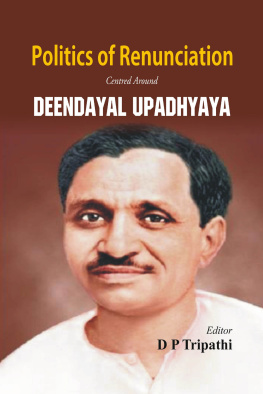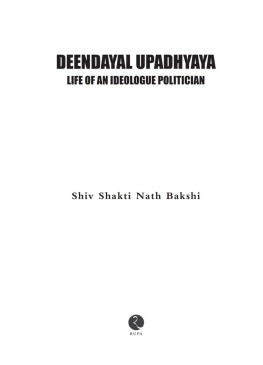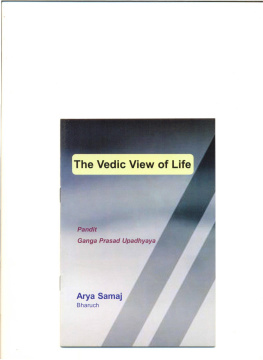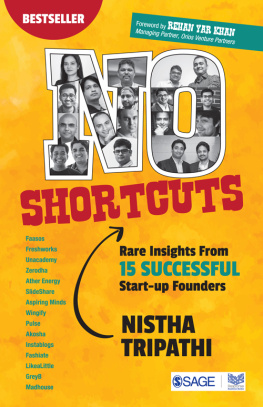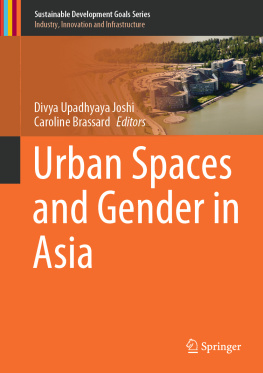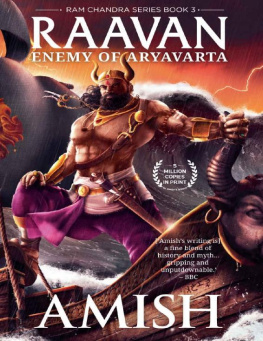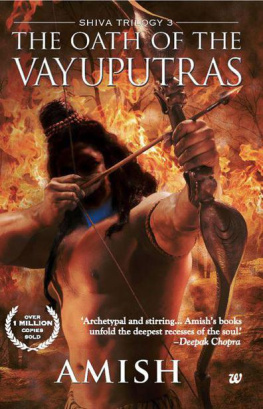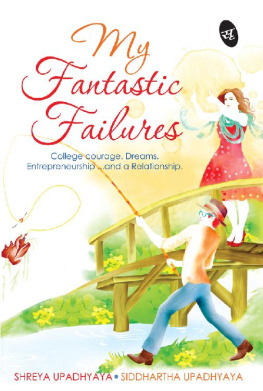Published by
Vij Books India Pvt Ltd
(Publishers, Distributors & Importers)
2/19, Ansari Road
Delhi 110 002
Phones: 91-11-43596460, 91-11-47340674
Fax: 91-11-47340674
e-mail:
web : www.vijbooks.com
Copyright 2019, Vichar Nyas Foundation
ISBN: 978-93-88161-32-9 (Hardback)
ISBN: 978-93-88161-33-6 (ebook)
All rights reserved.
No part of this book may be reproduced, stored in a retrieval system, transmitted or utilized
in any form or by any means, electronic, mechanical, photocopying, recording or otherwise,
without the prior permission of the copyright owner. Application for such permission should
be addressed to the publisher.
The views expressed in this book are of the contributors in their personal capacity and do not
represent the views of the Vichar Nyas Foundation/publishers.
D eendayal Upadhyaya has come to occupy the central place in political discourse ever since Narendra Modi became the Prime Minister of India in May 2014. The BJP-led NDA government under his leadership has launched a series of welfare programmes and schemes in honour of Upadhyaya, while also naming educational institutions and a major railway junction after his name. A high profile year-long birth centenary celebrations was concluded at a mega event in Delhi where Prime Minister Narendra Modi and Party President Amit Shah addressed a gathering of more than 2,000 BJP delegates. His writings have been compiled and re-launched, while all top party leaders as well as the President of India Ramnath Kovind have put him on the same pedestal as Mahatma Gandhi.
Whether Upadhyaya could be placed in the same league with Mahatma Gandhi or not is a matter of debate, there is unanimity among intellectuals that Upadhyaya was a high-caliber ideologue-activist. He sacrificed his life for his ideals. Shashi Tharoor describes him beautifully in his article in the book: Pandit Deendayal Upadhyaya was not just a theorist, but the leader of a growing political party and also its principal organizer As a political leader, it was imperative for him to respond to the day-to-day problems facing the party, critique government policies, issue and direct party propaganda, lead agitations, evolve the partys electoral strategy and negotiate coalitions. His philosophy was thus the animating spirit of a life of practical action that Upadhyaya anchored in his political values and philosophy.
He served the country for about twenty-seven years, out of which twelve were spent in the Rashtriya Swayamsevak Sangh and the rest in building up and organising the Jana Sangh, the precursor to the present day Bharatiya Janata Party (BJP). The story of the formation of Bharatiya Jana Sangh and Upadhyayas entry into active-politics is well known. After the untimely death of Shyama Prasad Mukherjee in 1953, the responsibility of building the organisation and presenting its world view in clear terms fell upon the shoulders of Upadhyaya. The new party had to be given a distinct political personality and had also to compete with the well-established political outfits.
He focused on what constituted the Indian nation, and why, in his view, it had failed to become strong and unified. He saw this failure in moral terms political corruption, the general publics lack of urge to make India strong and prosperous, a degeneration of society and the fading away of the idealism that had inspired the struggle for freedom. He believed that Indians had misled themselves into equating freedom with the mere overthrow of foreign rule. This negative view overlooked the need for something far more positive, a genuine and patriotic love for the Motherland.
Upadhyaya thus felt the need for a political philosophy befitting an ancient nation like Bharat which would be based on a positive concept of patriotism and a comprehensive vision of the nation as a complete entity its security, its unity, its growth and development, welfare of its entire populace and the full development of every individual based on its inherent character, culture, spiritual underpinnings and permanent values that have stood the test of time.
Once a journalist asked Deendayal Ji, Do you believe in Socialism? He replied, No. Then you must be believing in Capitalism?, asked the journalist. He again answered, No. The journalist was shocked to find a politician rejecting both the dominant systems. He then politely asked Are you without any political philosophy? Deendayal Ji in his own way posed a question, Do you think human mind has reached its limitations and there is no third way?
Upadhyaya believed that both socialism and capitalism concentrated their attention on mans material aspirations and on the fulfilment of his gross desires. Both had implicit faith in modern science and technological progress. In a centralised system of production, whether capitalist or socialist whether under individual or state control mans individuality is lost and he becomes a mere cog in the machine. Instead of bringing about human development by striking a balance between the material and spiritual needs, both systems have only created conflict. The answer lay in focusing on the human personality as a whole, for which Upadhyaya coined the term Integral Humanism.
Upadhyaya argued that unlike Western social and political theories, Integral Humanism did not emerge as a reaction to any particular circumstance and is based on positive thinking.If by nature man is such that he does not mind fighting with others to enrich himself at the cost of others, then it is impossible to teach him to love others and live for them. After examining different theories, Upadhyaya averred, it was clear that Integral Humanism was the only way forward. He advocated national reconstruction on the basis of this philosophy. The duty of Indians was not only to protect their culture, but to make it dynamic and efficient. If we march ahead, Upadhyaya concluded, we will be able to place before the world ideals like nationalism, democracy, equality and world-amity in a balanced and integral form, along with permanent values in Bharatiya culture.
But it is here that this wonderful idea of Upadhyaya strays into a sectarian straitjacket. The Bharatiya culture which he referred to had to be Hindu. Although as a Hindu, Upadhyaya said that he was not opposed to the Muslim and Christian modes of worship; he never criticized the Prophets of either faith. He believed that how to worship God, and which God to worship, was each persons personal choice; the state had no role in such considerations. His quarrel was not with any sect or mode of worship; it was purely political.
The critics of Hindu Rashtra, Upadhyaya argued, find that the term is inexpedient for them in the countrys competitive politics: they are afraid of losing millions of Christians and Muslim voters. Their misconception is that the use of the term Hindu Rashtra excludes Muslim and Christian communities. If both these communities become one with the national cultural mainstream without any change in their modes of worship they would be welcome in the new India. All they had to do was to own up to the ancient traditions of India, to look upon Hindu national heroes as their national heroes, and to develop devotion for Bharat Mata. Then they will be fully accepted as nationals of the Hindu Rashtra.


